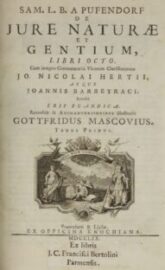De Jure Naturae Et Gentium Libri Octo
by Samuel Pufendorf
In 1672 appeared De iure naturae et gentium. This work took largely the theories of Grotius and many ideas from Hobbes, adding to them Pufendorf’s own ideas to develop the law of nations. Pufendorf argues that natural law does not extend beyond the limits of this life and merely regulates only external acts. He also challenges the Hobbesian thesis of a state of nature which is a state of war or conflict. For Pufendorf too there is a state of nature, but it is a state of peace. This natural peace, however, is weak and uncertain. In terms of public law, which recognizes the state (civitas) as a moral person (persona moralis), Pufendorf argues that the will of the state is nevertheless nothing more than the sum of the individual wills that are associated within it; hence the state needs to submit to a discipline essential for human safety. This ‘submission’, in the sense of obedience and mutual respect, is for Pufendorf the fundamental law of reason, which is the basis of natural law. He adds that international law should not be limited or restricted only to the Christian nations, but must create a common link between all peoples, since all nations are part of humanity.
